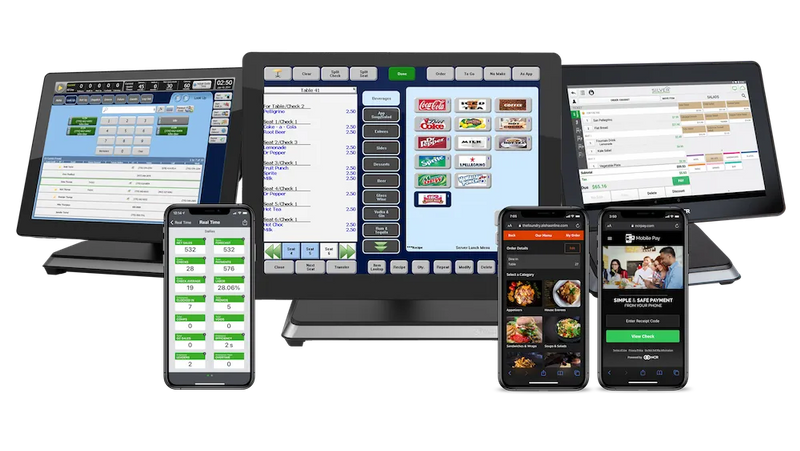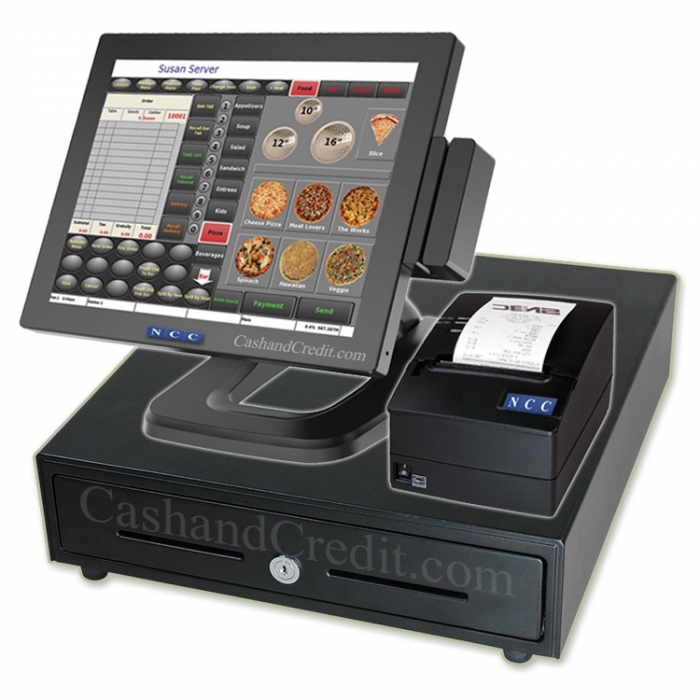Comprehending the Value of POS Software in Modern Retail Workflow
In today's retail landscape, the duty of POS software has become progressively significant. These systems have transformed from standard cash signs up to complex tools that boost different facets of operations. They not only improve deals but likewise give understandings that can form organization techniques. Comprehending just how these systems effect client experience and inventory management is essential for any retailer looking for to continue to be competitive. The effects of these innovations call for additional exploration.
The Advancement of POS Software: From Transaction Handling to Comprehensive Solutions

Enhancing Client Experience Via Advanced POS Features

Enhancing Inventory Management With Integrated POS Systems
Integrated POS systems play an important function in enhancing inventory administration by automating processes that commonly called for substantial hands-on initiative. These systems allow sellers to track inventory degrees in actual time, eliminating inconsistencies that commonly arise from hands-on stock matters. With attributes such as barcode scanning and automatic stock replenishment signals, organizations can keep optimal supply levels without overstocking or stockouts.Furthermore, integrated POS systems assist in exact forecasting by analyzing historic sales data, allowing retailers to make informed acquiring choices. This predictive ability assists companies adjust to altering customer needs and seasonal patterns more effectively.Additionally, the centralization of inventory information throughout several sales networks boosts exposure, enabling merchants to handle their stock extra efficiently. Ultimately, the assimilation of POS systems right into supply management streamlines procedures, minimizes human mistake, and adds to boosted profitability.
Real-Time Sales Tracking and Coverage for Informed Decision-Making

Accurate inventory management prepares for effective sales monitoring and reporting. Real-time sales tracking enables sellers to check sales performance as it takes place, offering instant insights right into customer getting patterns and patterns. This capacity enables organizations to respond quickly to variations sought after, optimizing supply degrees and decreasing overstock or stockouts.Moreover, incorporated POS systems promote the generation of thorough reports, highlighting vital metrics such as sales by group, period, and specific products. Such coverage capacities encourage stores to make data-driven choices, determining effective methods and areas needing improvement.
The Duty of POS Software in Customer Partnership Administration
POS software plays a crucial duty in improving consumer connection monitoring by making it possible for retailers to execute personalized marketing strategies. By analyzing customer information, businesses can tailor promos and interactions to meet private choices. Furthermore, these systems facilitate the development of improved loyalty programs that urge repeat company and strengthen client involvement.
Personalized Advertising Methods
As retailers significantly look for to boost client commitment and involvement, personalized advertising approaches have actually become an important component of reliable customer connection monitoring. POS software plays a crucial role in this procedure by accumulating and analyzing client information, making it possible for sellers to customize advertising and marketing efforts to private choices and buying actions. By leveraging insights from acquisition histories, merchants can create targeted promos and personalized interactions that resonate with clients, fostering a much deeper connection. Furthermore, the assimilation of POS software with consumer relationship administration systems permits for smooth tracking of consumer interactions, guaranteeing that marketing methods remain appropriate and prompt (Restaurant POS Software). This data-driven strategy not just boosts customer complete satisfaction but additionally drives sales and encourages repeat service, solidifying the retailer's market setting
Enhanced Loyalty Programs
Sellers are increasingly recognizing the importance of loyalty programs in fostering lasting client partnerships and enhancing general interaction. POS software plays a vital duty in the advancement and administration of these programs, permitting sellers to track customer acquisitions, choices, and behaviors effectively. By leveraging information analytics, organizations can develop personalized benefits and incentives that resonate with private clients, consequently boosting involvement in loyalty programs. Furthermore, POS systems make it possible for seamless assimilation with mobile informative post applications and digital platforms, helping with easy accessibility to benefits and promotions. This not just boosts consumer fulfillment but likewise drives repeat business. Ultimately, POS software encourages merchants to grow much deeper links with their clientele, changing occasional customers right into dedicated patrons via targeted and significant engagement methods.
Incorporating POS Systems With Ecommerce Platforms for Omnichannel Success
To achieve true omnichannel success, seamless integration between point-of-sale (POS) systems and e-commerce platforms is necessary. This integration allows merchants to link their inventory administration, making certain that item availability is properly reflected throughout both online and physical shops. Customers benefit from a cohesive purchasing experience, where they can easily change between channels without coming across discrepancies.Furthermore, integrated systems promote real-time data sharing, enabling organizations to analyze consumer actions and preferences better. This data-driven technique enables retailers to customize advertising approaches and maximize supply degrees, eventually boosting client fulfillment and driving sales.Additionally, the capability to process transactions throughout platforms simplifies operations, lowering the risk of mistakes and improving overall efficiency. As stores increasingly take on omnichannel methods, the integration of POS systems with e-commerce platforms continues to be an important consider attaining lasting development and keeping affordable benefit in the dynamic retail landscape.
Future Patterns in POS Modern Technology and Their Influence On Retail Operations
As retail procedures advance, future trends in POS innovation are established to reshape the landscape substantially. The rise of cloud-based solutions, technologies in mobile POS systems, and the advantages of AI integration are among the key growths expected to enhance efficiency and consumer experience. These advancements promise to improve procedures and promote a more dynamic retail environment.
Cloud-Based Solutions Rise
With the boosting reliance on technology, cloud-based POS remedies are transforming retail procedures by offering improved flexibility and scalability. These systems make it possible for merchants to accessibility real-time data from anywhere, promoting better decision-making and client service. By leveraging cloud framework, organizations can reduce ahead of time costs connected with equipment and software installations while ensuring seamless updates and maintenance. Additionally, cloud-based services support multi-location administration, enabling retailers to synchronize inventory and sales throughout numerous outlets effortlessly. This adaptability is essential in today's busy market, where customer preferences change rapidly. As more sellers adopt these solutions, they can anticipate enhanced functional efficiency and an extra responsive method to market demands, ultimately improving customer complete satisfaction and loyalty.
Mobile POS Innovations
The advancement of retail technology remains read this post here to form procedures, particularly with the increase of mobile POS advancements. These systems make it possible for retailers to process deals anywhere within the shop, enhancing customer interaction and simplifying checkout processes. Mobile POS solutions enhance inventory administration by allowing immediate accessibility to supply levels, assisting staff assist customers a lot more successfully. In enhancement, they help with individualized purchasing experiences via integrated customer data and commitment programs. As mobile phones become increasingly sophisticated, stores are taking on features such as contactless repayments and digital receipts, in addition optimizing the acquiring trip. The change towards mobile POS not just increases operational efficiency however likewise lines up with the expanding customer choice for comfort, ensuring that sellers remain affordable in a swiftly progressing market.
AI Integration Advantages
AI integration represents a transformative jump in POS innovation, offering merchants a myriad of advantages that improve functional effectiveness and client experience. By leveraging artificial intelligence formulas, sellers can analyze purchasing patterns and enhance supply administration, lowering waste and stockouts. In addition, AI-powered analytics offer customized advertising and marketing recommendations, enabling targeted promos that raise client involvement and loyalty. Chatbots and virtual assistants enhance client solution, permitting for quicker resolution of inquiries and improving the general buying experience. Predictive analytics can likewise anticipate need fads, making it possible for smarter staffing and source allocation. Ultimately, the integration of AI in POS systems empowers merchants to make data-driven decisions, fostering an one-upmanship in an ever-evolving retail landscape.
Often Asked Inquiries
What Are the Expenses Connected With Carrying Out POS Software?
The expenses linked with carrying out POS software can include software licensing charges, equipment costs, installment fees, training costs, and recurring upkeep. Each aspect contributes to the general investment needed for a successful application.
Just How Can Little Retailers Benefit From POS Systems?
Little retailers can gain from POS systems through improved purchase effectiveness, structured stock management, and improved customer understandings. These systems enable far better decision-making, ultimately bring about raised sales and consumer complete satisfaction in affordable markets.
What Equipment Is Required for a POS System?
A normal POS system requires important equipment parts, consisting of a touchscreen display, money cabinet, barcode scanner, receipt printer, and settlement terminal. These components function with each other to facilitate reliable transaction handling and stock management for sellers.

Can POS Software Be Customized for Certain Retail Requirements?
POS software can indeed be personalized to fulfill specific retail demands. Restaurant POS Software. This flexibility allows services to customize attributes, interfaces, and coverage tools, enhancing operational performance and giving an extra individualized experience for both staff and clients
How Safe Is Customer Information in POS Systems?
The protection of client data in POS systems varies extensively. Many systems carry click reference out file encryption, secure accessibility controls, and regular updates, yet vulnerabilities can still exist, necessitating continuous caution and proactive procedures from sellers to protect sensitive information.